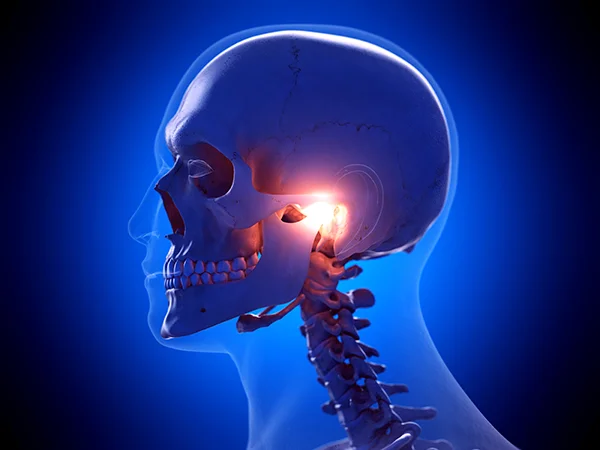TMJ The temporomandibular joint (TMJ) is a simple hinge that helps connect the jaw to the temporal bones in the skull, located right in front of the ear. This joint makes it easy to chew, yawn, and even talk. When you have issues with the jaw or the muscles that control this part of the face, they are known as temporomandibular disorders or TMD. Sometimes the condition is known as TMJ, though this refers to the joint that causes you problems. When TMD occurs, our team at Robert F. Walker Jr. DDS is here to help provide solutions to make it better. The temporomandibular joint (TMJ) is a simple hinge that helps connect the jaw to the temporal bones in the skull, located right in front of the ear. This joint makes it easy to chew, yawn, and even talk. When you have issues with the jaw or the muscles that control this part of the face, they are known as temporomandibular disorders or TMD. Sometimes the condition is known as TMJ, though this refers to the joint that causes you problems. When TMD occurs, our team at Robert F. Walker Jr. DDS is here to help provide solutions to make it better. What Causes TMD?The exact causes of TMD is unknown. Our dental professionals believe that symptoms can arise from problems within the jawline or even in the joint itself. Injury to the jaw, the joint, or to the muscles of the head and neck, can lead to TMD. There are a few other things that may cause this condition in patients including clenching or grinding your teeth, movement in the soft cushion between the ball and the socket of the joint, stress that causes the jaw muscles to tighten, and arthritis in that joint. What are the Symptoms?While the symptoms of TMD may take some time to show up, this condition can cause pain and discomfort. Depending on whether you look for relief to the pain, it can be a temporary problem or something that lasts for years. You may notice that there is some tenderness or pain in the jaw or face or problems when you open your mouth wide. If the jaws get stuck, either when opening or closing, or there are clicking and popping sounds when you move the jaw, this can be a sign you are suffering from TMJ/TMD. It is not uncommon for the individual to get toothaches and headaches from this as well. These are often the symptoms that cause them to go for a dental checkup and how TMJ/TMD is diagnosed. How is TMD Diagnosed?It is often through other oral health problems that our dental team will see a patient and be able to diagnose TMD. The patient may have issues like gum disease, arthritis, sinus issues, or tooth decay and then come into our office for those conditions. We can then do a physical checkup of the mouth to see where the root of the problem lies. It is during that time we can find TMD. Through our physical checkup, we will take a look at the joints of the jaw for pain and tenderness. We may ask the patient to move their jaw a bit so we can listen to clicks, pops, and grating sounds. We can even test the bite to see if there are some issues with how well the facial muscles can perform. Let Us Help Relieve Your Jaw PainOur team at Robert F. Walker Jr. DDS are here to help when you experience TMD in your jaw. This can be painful and needs to be addressed as soon as possible. When you are ready to set up an appointment to discuss TMJ or TMD with one of our dental professionals, contact us at (480) 786-4000. Areas We Love to Serve! |